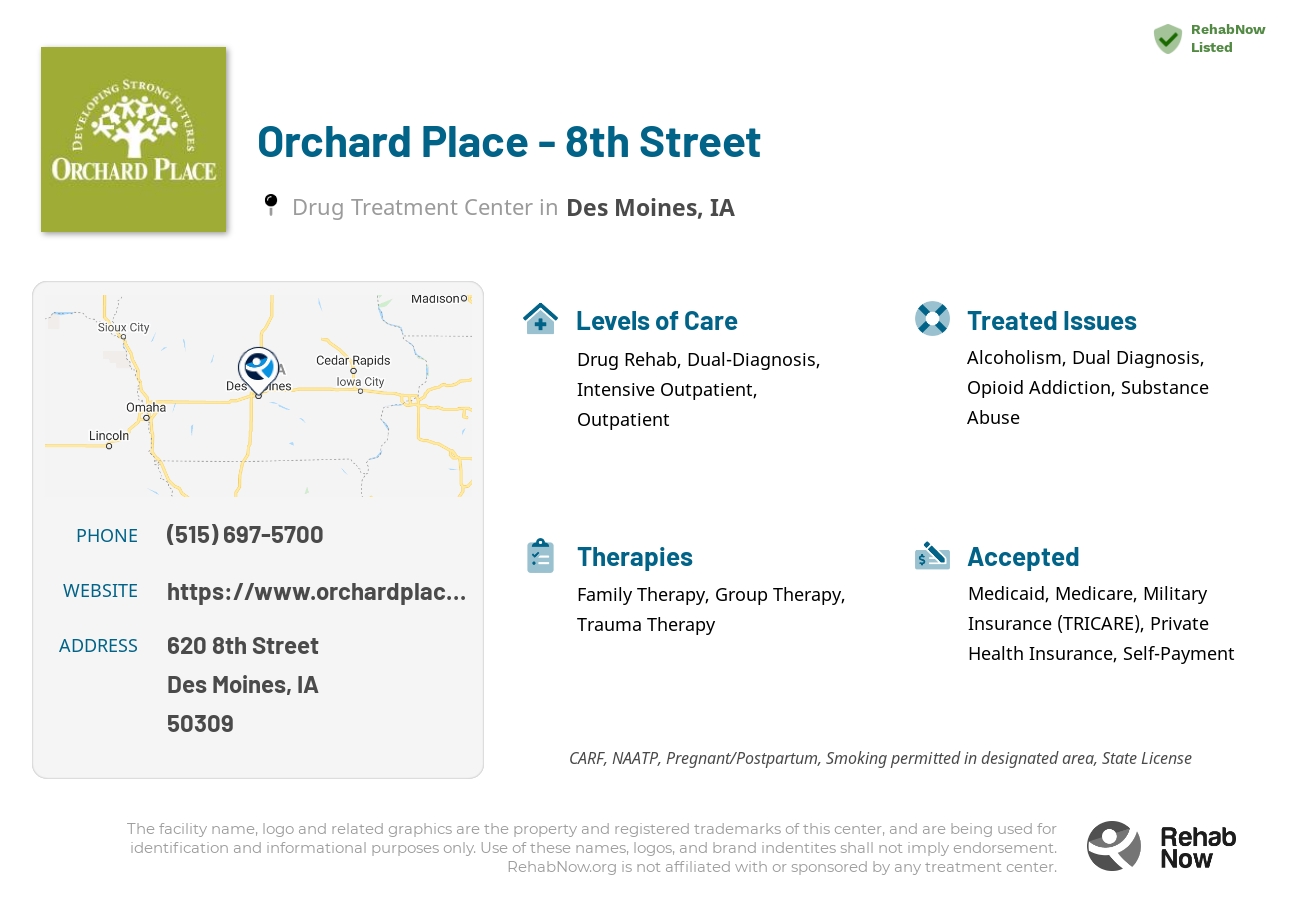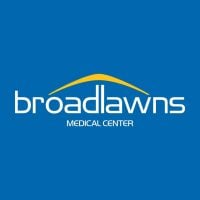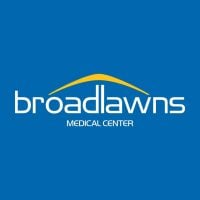Orchard Place - 8th Street
Drug Rehab Center in Des Moines, Iowa
Orchard Place - 8th Street in Des Moines, Iowa is a non-profit addiction treatment center that offers evidence-based treatment for substance use disorders, mental health issues, and trauma-related problems, with services including counseling, medications, relapse prevention programs, family therapy, community outreach, detoxification, and medication-assisted treatment for opioid addiction.
About Orchard Place - 8th Street in Iowa
Orchard Place - 8th Street is a non-profit addiction treatment center located in Des Moines, Iowa. It is dedicated to providing evidence-based treatment for substance use disorders, mental health issues, and trauma-related problems. They offer a variety of services and provide customized treatment plans for each individual. In addition to traditional treatment for addiction, Orchard Place - 8th Street also offers relapse prevention programs, family therapy, and community outreach. They are passionate about breaking cycles of addiction and helping individuals achieve long-term sobriety.
At Orchard Place - 8th Street, individuals have access to addiction counseling, medications, and other treatments that can effectively help them gain control over their addiction. These treatments can range from brief screenings and interventions to ongoing, intensive therapy. Additionally, they provide resources and education with the goal of helping individuals make healthier decisions that prevent relapse. Orchard Place - 8th Street also provides detoxification and medication-assisted treatment for opioid addiction.
Orchard Place - 8th Street is a certified member of the Iowa Alcohol and Drug Treatment Association and is accredited by the Joint Commission on Accreditation of Healthcare Organizations. They also have received several awards and recognitions for their commitment to providing quality care and their impact in the community. In addition, they are a member of The American Society of Addiction Medicine, the National Association of Alcohol and Drug Addiction Counselors, and the National Implementers Network.
Genders
Ages
Modality
Additional
Conditions and Issues Treated
Substance abuse is a severe problem that affects many people in Des Moines, IA. It is characterized by the excessive and inappropriate use of drugs, including alcohol, medications, and illicit drugs. Substance abuse can lead to physical or psychological dependence and affect social life and relationships. Treatment options include medications, counseling sessions, behavioral therapy, and group therapy. If you are suffering from substance abuse, contact for the latest treatments available.
Opioid addiction is when someone becomes addicted to opioids. This can happen quickly due to any opioid use. Opioid withdrawal can be uncomfortable and lead the user to continue using even if they want to quit. It’s best to receive inpatient treatment for detoxification.
Even if a person doesn’t need inpatient treatment, it’s recommended to start rehabilitation or at least some kind of outpatient treatment. This is because the withdrawal symptoms from opioids can be uncomfortable and unpleasant, to the point that a person could end up using again or worse.
Detoxification should be done to break the physical addiction of opioids. This can be done with opioid replacement therapy, medication-assisted therapy, or a more traditional detoxification program. Intensive outpatient treatment is a form of addiction care that allows patients to continue living at home while undergoing treatment. This type of care is appropriate for patients who have been treated in residential treatment programs. Intensive outpatient programs include regular visits to the facility providing therapy, and patients gradually return to their routine life. IOP benefits most when patients have a supportive family member or friend to help them recover.
The first step to getting into an intensive outpatient program is to attend a detoxification facility. Detoxification facilities are designed to remove substances from the body safely. The patient will attend sessions designed to help them understand their addiction and its impact on their lives. While in an intensive outpatient program, therapy sessions are scheduled three to five times per week, with the patient attending no more than two sessions in one day.
Dual Diagnosis therapy is considered more successful than traditional rehab methods because it treats the addiction and the underlying mental health disorder simultaneously. This comprehensive approach gives Des Moines, IA patients the best chance for long-term recovery. If the patient does not receive treatment for both conditions, they are more likely to relapse.
Levels of Care Offered
This center offers a variety of custom treatment tailored to individual recovery. Currently available are Drug Rehab, Dual-Diagnosis, Intensive Outpatient, Outpatient, with additional therapies available as listed below.
An intensive outpatient treatment program, or IOP, is set up for those struggling with an addiction to begin the recovery process. However, the patient will not live at the facility during treatment.
IOP involves patients coming in and out of a medical office building regularly to receive therapy and other services while continuing their life outside of these visits.
IOP is a step up from drug detoxification or alcohol detox. However, it’s still considered a phase of recovery rather than the ultimate goal. There are many rehabs and treatment facilities available to patients in need of IOP.
Outpatient treatment consists of counseling and therapy sessions. The outpatient treatment process begins with the addict’s initial detox period, lasting about ten days. Outpatient treatment is used for those who are at moderate risk for “slipping back” into the addiction. It is also used for those who are not currently experiencing any side effects from withdrawal, can handle social pressure, have a stable living environment, and have a good support system.
Therapies & Programs
Family therapy is a crucial part of drug treatment and getting sober. It is one of the most effective ways to help addicts stay on the path to long-term sobriety. One of the most important parts of family therapy is the relapse prevention plan. During treatment, therapists and doctors will often sit down with the addict and their family to develop a plan if the addict ever feels like they want to use again. This plan should involve steps the addict and family can take together to prevent them from relapsing in the future.
An addict’s family can play a vital part in helping them to avoid relapse because they can spot the warning signs and help them get back on track before it becomes too much of a problem. Family therapy is one of the most effective ways to help addicts stay on the path to long-term sobriety.
Group Therapy is employed by drug treatment centers like Orchard Place - 8th Street to provide the recovering addict with a platform to talk about their feelings and experiences. It also provides for an opportunity to learn from other addicts who have successfully overcome their addiction. It is recommended that all group members be recovering addicts for this type of therapy to work.
This type of therapy involves the use of a variety of therapeutic techniques to help addicts recover from past traumas that might have triggered their substance abuse. During these sessions, therapists will work with the addict to address painful memories and learn how to cope effectively with stressors as they arise.
During these types of sessions, therapists will typically focus on three main goals:
- Identifying and expressing painful emotions associated with past traumas.
- Reducing the effects of stress on an addict’s life by developing more effective coping mechanisms.
- Developing healthy ways of thinking about stressful situations that can help addicts avoid substance abuse issues in the future.
This type of therapy is typically used in conjunction with other types of addiction treatment services. By identifying and dealing with the root cause of addiction, most addicts can overcome their cravings and prevent relapse once they leave rehab.
Many different types of addiction treatment services exist to help addicts safely get sober, but it’s important for recovering individuals to find a therapist or support group that will help them address the root cause of their addiction.
Payment Options Accepted
For specific insurance or payment methods please contact us.
Is your insurance accepted?
Ask an expert, call (888) 674-0062
Orchard Place Associated Centers
Discover treatment facilities under the same provider.
- Orchard Place - Porter Avenue in Des Moines, IA
- Orchard Place Child Guidance Center in Des Moines, IA
Learn More About Orchard Place Centers
Additional Details
Specifics, location, and helpful extra information.
Des Moines, Iowa 50309 Phone Number(515) 697-5700 Meta DetailsUpdated November 25, 2023
Staff Verified
Orchard Place - 8th Street Patient Reviews
There are no reviews yet. Be the first one to write one.
Des Moines, Iowa Addiction Information
Iowa ranks 2nd lowest in the nation for illicit drug use, but 12% of its residents are still using these drugs every single year. Methamphetamines account for more than 90% of all drug-related prison admissions in Iowa. Alcohol is the most widely abused substance in the state, with 23% of residents admitting to heavy drinking.
In Des Moines, the number of drug-related deaths has increased in recent years. In 2013, there were 31 drug-related deaths, which is up from 26 in 2012 and 23 in 2011. The majority of these deaths were caused by heroin or prescription opioids. Some of the most commonly abused drugs include marijuana, cocaine, heroin, and prescription opioids. If you or someone you know is struggling with addiction, please reach out for help.
Treatment in Nearby Cities
- Pocahontas, IA (95.6 mi.)
- New Providence, IA (53.4 mi.)
- Colfax, IA (20.7 mi.)
- Estherville, IA (139.8 mi.)
- Winterset, IA (26.8 mi.)
Centers near Orchard Place - 8th Street
The facility name, logo and brand are the property and registered trademarks of Orchard Place - 8th Street, and are being used for identification and informational purposes only. Use of these names, logos and brands shall not imply endorsement. RehabNow.org is not affiliated with or sponsored by Orchard Place - 8th Street.









